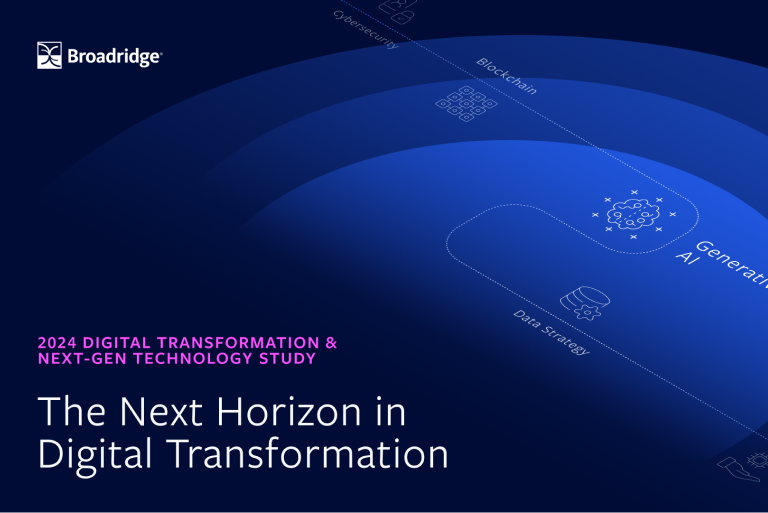transformation yields fruit
The good news is that the last several years of heavy investment into underlying technology infrastructure and updating legacy system appears to be paying dividends when it comes to building a foundation to support today’s technology needs. A strong majority (72%) of wealth firms say they are confident about the progress they are making on their digital transformation journeys.
More than 80% of firms are prioritizing investments in their core IT platform, including cloud, cybersecurity, data management, and AI.




Not all firms are at the same level of digital maturity, however...
Overall, just 30% of those surveyed are categorized as Leaders based on their progress implementing the essential aspects of digital transformation. Among Leaders, 60% have developed advanced digital customer experiences, 57% are in the advanced stages of digital transformation of their data management capabilities, and 57% have modernized their core IT infrastructure. Non-leaders, by contrast, have considerably lower rates of adoption of advanced digital customer experience (13%), advanced digital data management (22%), and modernization of core IT platforms (20%).
Source: Broadridge 2024 Annual Digital Transformation & Next-Gen Technology Study
Video Transcript
Speaker 1: Alicia, thank you so much for doing this.
Speaker 2: Thanks for having me, Jamie.
Speaker 1: So we're going to talk about, digital transformation and where institutions and investors are along their route to sort of full digitalization, should we say. How are institutions finding out more about what their clients and investors want?
Speaker 2: Data is king right now. If there's much more that you can understand about a consumer, how they're interacting with you, with your brand, with your employees, with financial advisors, that's really setting the stage for how do you want to continue engagement with with our clients. And it's not just about thinking about wealth management. We need to think more broadly. There's, you know, our clients are walking around with a computer in their phone with their mobile devices, and they're interacting with brands in lots of different ways. So how from a wealth management perspective, can we take a look at some of those experiences, some of those that might reduce friction, give customers more accountability, and give them more empowerment in managing their everyday finances? Those are the areas where firms are now paying more attention. How do I personalize those experiences? How do I make sure that my customer is getting the best out of every engagement that they have with us, the brand, as well as with their advisors?
Speaker 1: And really, what's driving the sort of product innovation? Is it client demand? They want to see more, you know, offers on the table or is it or is it digitalization itself? It's like there are so many more things we can do now. We're able to offer more.
Speaker 2: It's a it's a little bit of both. For me, the most important piece is what am I hearing from my customer base? What what are the expectations? And as we look at the changing face of the investor changing face of the consumer, what is the expectation going to be for them, not just today, but in five, ten years? You also then have a younger workforce coming into play, and they want to do more exciting things. They want to understand emerging technologies, they want to understand how they can continuously improve. And that dynamic of the two together. Understanding where your investors and your consumers are, understanding where your employees want to be just to be continue to be engaged. And that coming together is really what's driving a lot of the strategies across the industry.
creates new challenges
Overall, 72% of firms are prioritizing investments in AI, and Leaders are making significant investments in GenAI at twice the rate of non-leaders.
While firms are generally optimistic about the promise of AI to improve customer interaction, research, and risk analysis, the majority of firms (51%) still have concerns about the security and data privacy risks associated with AI and one-third (33%) do not have systems in place for managing these risks.


to client-centricity
Perhaps the most compelling finding in this year’s study, however, is the widespread recognition among firms that technology – particularly AI – has increasingly become the key to unlocking more personalized, client-centric views. Whereas the conversation around wealth management tech used to center on automation, efficiency, and cost-savings, wealth firms are now focusing their tech investments on building better client relationships.
When asked what they would choose if they had a magic wand to accelerate transformation, the top choice was a “crystal ball to predict future customer needs.” Another 38% said being customer obsessed was a top accelerator of digital transformation. The top area where the majority (56%) of firms are prioritizing AI investment is in customer interaction. Likewise, 82% of firms say they are making moderate or large investments in data analysis and visualization tools to improve the way they share market and portfolio information with clients.




While client-centric personalization is the goal, many firms still have work to do to reach it. Currently, just 27% of all firms are at the advanced stages of offering seamless digital experiences.
Video Transcript
Speaker 1: James, absolute pleasure to meet you.
Speaker 2: Nice to meet you too. Great to be here.
Speaker 1: James, let's talk a little bit about today and look into the future. You guys have brought Reg up front and center in terms of product development. And the technology you have is is right at the forefront. What are you most excited about in terms of product offering to your clients, and what are the real trends that you're seeing today?
Speaker 2: I think overall, you know, what we're really excited about at Broadridge is some of our new technology that helps us connect different elements of the value chain together. So, you know, typically what we've seen over the last ten years has been firms really focused, focused tech firms really focused on delivering a very efficient value added point solution. But that point solution doesn't always work very well within the broader ecosystem of wealth management. And that's where, you know, we've made some recent investments and have some new tech coming to market that really helps both on the user interface side of things as well as on the service side of things. Hold these things together and integrate these applications in meaningful ways. That's going to unlock productivity for advisors. And you know, what's really, important about that is when these these tasks are so burdensome for advisors, to undertake today, switching between applications. Right. Kind of swiveling the chair around and looking at all the different things that they have to do. Yeah. It, it it discourages them from actually going out and doing these things more frequently. And so, you know, like let you take the example of a financial plan. If your financial planning software is really integrated with your proposal generation software, which is really integrated with your reporting software and your ability to execute and rebalance on that plan. Well, then maybe, you know, I might offer a number of plans to my clients based on their specific objectives for certain, you know, elements of their portfolio rather than just a single financial plan. So I think we're really excited about how bringing the technology together can unlock that productivity and increase advisor adoption and usage of the technology. There are already great technology that's out there today.
multigenerational, omnichannel flexibility
The technology transformation unfolding in the wealth management industry is occurring alongside a paradoxical shift in demographics whereby advisors are getting older (average age of 56 years-old[1]), and the pipeline of new clients is getting younger, with 65% of Millennials likely to use financial advisor in next two years[2]. To successfully manage that transition, wealth management firms need to prioritize flexibility and personalization, and the executives we surveyed clearly see technology as the path to achieving that balance.
But getting that formula right requires a thoughtful approach to technology, one that allows for seamless integration and flexible application. Whether it’s landing on the right channel for client communications, presenting data in an intuitive package or facilitating insights between advisors and other team members, firms need an approach that supports technological transformation where it’s needed but does not mandate it where it’s not. That sentiment shows up clearly among the 26% of respondents who feel the keys to successful digital transformation at their firms will be getting control of data to leverage insights across the enterprise, breaking down silos to ensure cross-functional collaboration, and focusing on the human part of change, not just technology.
Source: Broadridge 2024 Annual Digital Transformation & Next-Gen Technology Study
What’s happening as firms adopt a more integrated, enterprise approach to digital transformation is a migration away from point solutions and bolt-on technology tools that do not connect or speak with one another. This trend is manifesting in the 81% of firms that are investing heavily in cloud platforms and applications and 48% are investing in open platforms and API architectures.
By connecting data and analytics across the entire enterprise, firms are recognizing the potential to meet clients and advisors where they are, delivering consistent insights on flexible platforms.
Video Transcript
Speaker 1: Hey, Donna, thank you for doing this.
Speaker 2: Well, thank you, Jamie.
Speaker 1: So we're going to talk about digital transformation and where institutions and investors are along the along their route to sort of full digitalization, shall we say. So let's talk about the tools that are at the fingertips of savers now with digitalization. Is it there's more of a product offering between investments that they're open to? Is it different asset classes? Is now real estate an option for people who maybe can't afford to buy a house but can get exposure to it?
Speaker 2: Investors can do some of their own investing through a robo advisor type toolset where they're picking their own investments through a model portfolio. It's all automated. They can manage it themselves, quite frankly, and then they can see how their portfolios growing over the X period of time where now an advisor can offer that type of capability. But also in relation to also providing advice on more complex situations, more complex investment decisions and actually helping them with that whole lifecycle management as they go through their life cycle.
Speaker 1: Well, let's talk about that lifecycle for a second. How personal is this relationship now getting? I mean, what do they want to know about me?
Speaker 2: Quite frankly, they want to know everything about you. An advisor really is around that relationship, not only with you, but your your partner or your family. And it's about a deep understanding of that relationship. They want to ensure that they're helping you make the right decisions. And in order to do that, using tools like financial planning tools, sending out digital marketing, being able to see what interests you have, all helped them make that educated decision and help with you with your decisions moving forward and using financial planning tools, sending out information and getting feedback from you in a digitized manner allows the advisors to easily process that information either themselves or using A.I. tools. So then they know and can understand how best to engage with you and build that relationship, build your confidence and ensure that you're getting ready for a good retirement in the future.
Speaker 1: So what are the big trends you're seeing now? Let's talk about the future of of wealth.
Speaker 2: Big trends are the ability to provide tools, investments to the affluent investor that typically in the past, the high net worth or mass affluent was only only had access to. And then when we look at A.I. and the ability to process large amounts of information, the ability to provide personalization, how an investor wants to be contacted, how you want to be discussed on your portfolios, etc. That's really becoming key to an advisor on how they service you.
increased emphasis on data security
Another recurring theme throughout the study is the increasingly critical role that cybersecurity and data privacy play as technology proliferates across the wealth management workflow. Firms clearly recognize the risks associated with the ongoing digitization of the industry, and those risks affect every decision they make, from where to invest to how they evaluate vendors and partners. In fact, the biggest single area where firms are spending on technology right now is in cybersecurity, with 88% of firms making moderate or large investments this year.
Likewise, 28% of firms are increasing their cybersecurity budgets, and 44% of firms say the number one thing they expect from their technology vendors is cybersecurity assurance.
Source: Broadridge 2024 Annual Digital Transformation & Next-Gen Technology Study
Want to learn what others in financial services are doing on their digital transformation journey?
Read the full Broadridge 2024 Digital Transformation & Next-Gen Technology Study.
Broadridge prepares you for what’s next
Broadridge has a suite of solutions to help you reach your transformation goals: powering the future of global trading and operations, delivering simplification, and incorporating innovation across the trade lifecycle.
Connect with our experts about the future of digital transformation
Thank you.
Your sales rep submission has been received. One of our sales representatives will contact you soon.
Want to speak with a sales representative?
| Table Heading | |
|---|---|
| +1 800 353 0103 | North America |
| +442075513000 | EMEA |
| +65 6438 1144 | APAC |




